Who doesn’t love a heaping scoop of ghee melted over the top of their rice or Khichdi? Yum! If you’ve ever been lucky enough to experience the rich, nourishing, and luxurious qualities of this golden elixir, you’ll understand why ghee is a must-have in every Ayurvedic kitchen. But have you ever wondered why desi ghee is so highly revered in Ayurveda? We’re going to demystify this deliciously healthy fat and cover everything from the history of desi ghee to its wide array of health benefits and uses. Now the question is – Where can I buy Desi Cow Ghee? Buy ghee online at our online store. Visit our website https://sureshdesighee.com/ to know more.
What Is Desi Ghee?
Desi ghee is that beautifully golden yellow substance left over after the impurities of butter have been melted away. Also known as clarified butter or anhydrous milk fat, desi ghee has been used for thousands of years in Ayurveda for cooking and religious ceremonies, as well as therapeutically, both internally and externally.
Ghee is made from butter, but has gone through a clarification process which put away the parts of butter that are the most difficult to digest, such as lactose, casein, whey proteins, and trace minerals.
Is Ghee Dairy Free?
Technically, ghee is not dairy-free because it’s butterfat. However, it is lactose-free because all of the milk solids are completely removed during production. So if you’re avoiding dairy because you’re lactose intolerant, desi ghee is a safe option for you. It’s a great choice to butter, and if consumed in moderation, can be a healthy addition to any diet.
Does Desi Ghee Taste Like Butter?
Although desi ghee does not taste exactly like store-bought butter, it still has a delicious taste and a smooth quality. Some even consider it to be better and don’t want to return to regular butter after experiencing the taste.
Consuming Ghee on a regular basis Good or Bad ?
Ghee is considered to be a rich source of antioxidants,vitamins and healthy fatty acids that promotes gut health, lowers the risk of heart disease, also research has shown that due to the presence of Vitamin E that has significant antioxidant properties have been linked to lowering the risk of cancer as well as arthritis when consumed moderately in daily diet.
Consumption of ghee in small portions on a routine meal can improve overall health, strengthen bones and improve intellectual health.
Weather ghee is considered to be an Indian Superfood ?
A rich source of conjugated linoleic acid (CLA), ghee is renowned as a good source of nutrition for the body as it consists of healthy fats and is also rich in protein. Such clarified butter consists of milk fats and protein, which is believed to be safe for heart health. Not just a replacement for cooking oil, a natural addition like ghee can be a perfect topping to any meal. Being rich in antioxidants, like vitamin E and Omega-3 fatty acids which is responsible for keeping the cardiovascular system healthy as this superfood also consists of butyrate which is another form of fatty acid that keeps the gut health in good condition.
Consuming ghee has any effect on our mind ?
Ghee consists of healthy fats that are nourishing for your brain such as omega 3 fatty acids which helps in supporting mental and intellectual health as research has shown that foods that are rich in omega-3 fatty acids have shown to lower risks of dementia. Also, a human brain is made mostly of fat that includes the myelin sheaths that insulate each of our neurons cells in our brains. Hence,we need to consume pure desi cow ghee as it consists of fats that helps to maintain a healthy mental health.
Read our blog – Why The Pure Desi Cow Milk Ghee Is Costlier Than Normal Ghee?
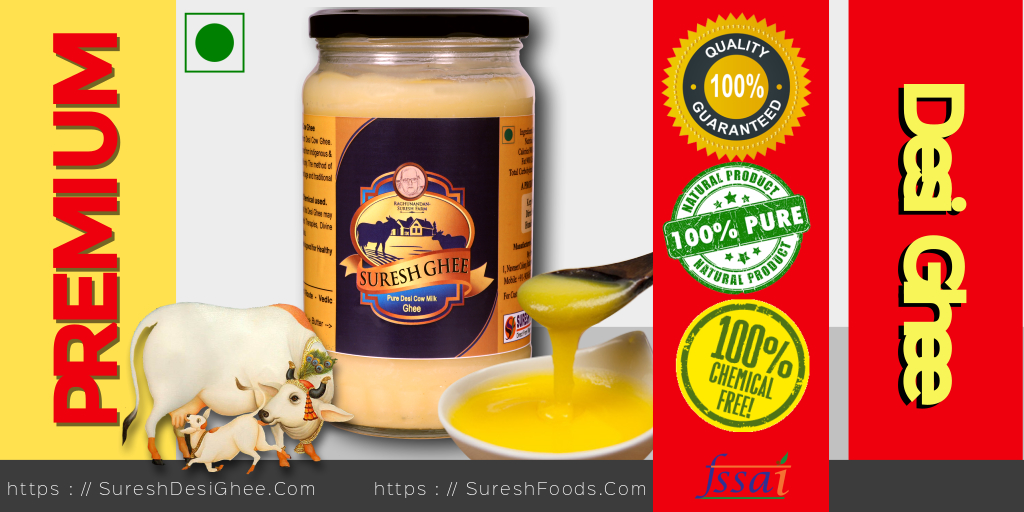
Is Ghee Healthy?
We have all heard that we should be consuming butter in moderation because it’s high in saturated fat, which has been connected to hyperlipidemia (high cholesterol) and heart disease. Is ghee the same, nutrition-wise?
Like butter, ghee is made up of mostly fat, especially saturated fat, although it does contain monounsaturated and polyunsaturated fats. 1 tablespoon has about 8 grams of saturated fat, so it should definitely be consumed moderately as part of a healthy and well-balanced diet.
However, ghee does contain many health benefits. Because it’s a source of fat, it’s high in fat-soluble vitamins like A, E, and D. In addition, it contains a short-chain fatty acid called butyric acid, which may reduce swelling, specifically in the gastrointestinal tract.
The most widely known nutritional value of desi ghee is its high smoke point. Smoke point is the stage at which an oil/fat starts to break down and literally smoke when heated, at which point free radicals can cause oxidative stress in the body are formed. At 485°F, Ghee smoke point is high, which makes it perfect for high-heat cooking, frying, roasting and baking. This is much higher than butter smoke point of 200-250°F, and olive oil’s of 375°F.

Read our blog: Desi Cow Ghee Benefits For Brain
- Ghee’s ointment quality increases the juices of the body (rasa), providing ease of movement and transport of nutrients and wastes.
- Being a fatty base, desi ghee increases kapha within the body, and therefore increases the most refined by product of kapha—ojas (the essence of immunity and life). Because desi ghee does fuel the digestive fire, it facilitates the conversion of raw kapha into ojas.
- Similarly, ghee can facilitate the movement of toxins (ama) and other wastes out of the body through the digestive tract.
- Ghee is free of lactose and casein, and is high in beneficial compounds like CLA (conjugated linoleic acid) and butyrate.
- Ghee contains several fat-soluble vitamins, including vitamins A, E and K.


Read our blog: History Of Desi Cow Ghee
Is ghee good for you?
Ghee, and other healthy fats, have been in the headlines recently, but how healthy actually is it? Ghee is almost pure fat, but some people think that because it’s a natural product it’s a better option to the kinds of trans fats found in some margarines and vegetable oil spread. It has been argued that desi ghee is better for you than regular butter too.
Ghee contains fat soluble vitamins A,D, E, & K, so can help you with your daily intake of vitamins A and K. Ghee is also free from lactose & casein, due to the clarification process, so is suitable for those with lactose allergies.
We are all being told to eat less sugar & more fat, as healthy fats help with cell membrane structure, allowing your body to absorb nutrients and your immune system to function at its best. Ghee, however, consists of mainly saturated fats, so be sure to limit your intake, as saturated fats have been linked to heart disease and diabetes. When it comes to fats, the information out there is mixed, but the take home message is to include fats like desi ghee in your diet, in moderation, to get maximum benefits but avoid the setbacks.
How to Use Desi Ghee
Ghee can be used both internally and externally. Externally, ghee will soothe irritated skin. Internally, it nourishes the digestive tract and any tissue it is carried to, particularly the reproductive tract.
- Cooking with desi ghee is a popular component of most Ayurvedic recipes. Ghee is an ingredient in khichdi, baked apples, green mung beans, rice porridge, creamy urad masala, spiced rice with cashews, and more.
- For beauty, desi ghee makes an excellent natural eye makeup remover.
- Ghee is commonly used in cleansing.
- The nourishing and hydrating qualities of desi ghee make it good for massage, particularly for dry or vata-type skin.
- Ghee’s affinity for soothing irritated skin makes it ideal for comforting babies with diaper rash.
- Consider using desi ghee for hair to add moisture and nourishment to dry follicles.
How to Store Desi Ghee
Ghee does not need to be refrigerated. Because the water content of ghee is minimal (0.03 grams per 1 tablespoon serving, versus more than 2.5 grams per 1 tablespoon of butter), ghee stays fresh for much longer than butter. In fact, as long as it is kept sealed and in a light-proof, dry area, ghee will keep for one year or more easily.
Desi Ghee usage is not limited to oral consumption. It has been used in many Ayurvedic medicinal therapies like Netra Tarpan, Netra Basti , Abhyanga (“oil massage”) is a form of Ayurvedic medicine that involves massage of the body. Ghee is being used for relaxing our body and mind. It’s historical list of applications as a medicinal agent is long. It’s used as a moisturizer, an anti-inflammatory, burn salve, and to lubricate/soften hardened tissues throughout the body. It’s even said to increase longevity and ward off disease. Safe to say, the aromatic nature of ghee is a health benefit in and of itself.
On a broad level, grassfed ghee is said to encourage fat metabolism and weight loss due to the high levels of Tonalin CLA, supports stable moods and consistent energy levels, and boosts the body’s natural defenses against harmful bacteria. Ghee is also loaded with essential items like butyric acid, an essential component to a healthy digestive tract. In addition, it includes short-, medium- and long-chain fatty acids (used by the body immediately, as energy), Omega 3 and Omega 9 essential fatty acids; vitamins A, D, E K; plus many more antioxidants and minerals.
Ghee has been treating our souls too. In our Vedas – Ghee is called Satvic. Ghee is also burnt in the Hindu religious ritual of Aarti and is the principal fuel used for the Hindu votive lamp known as the diya or deep. It is used in marriages and funerals, and for bathing murtis during worship.
COW’S GHEE HELPS IN CANCERPure Desi Ghee Price Online: 1 kg Ghee Price is Rs 2400/-Health Benefits Of Drinking Milk With Ghee At NightBenefits Of Applying Desi Ghee For Face OvernightDesi Cow Ghee BenefitsBest Ghee For Babies, Infants Skin And Ghee Massage For BabiesGhee For Mental HealthDesi Cow Ghee For Hair Growth, Hair Fall Treatment & Regrowth BenefitsDesi Cow Ghee vs Buffalo Ghee vs Jersey Cow Ghee

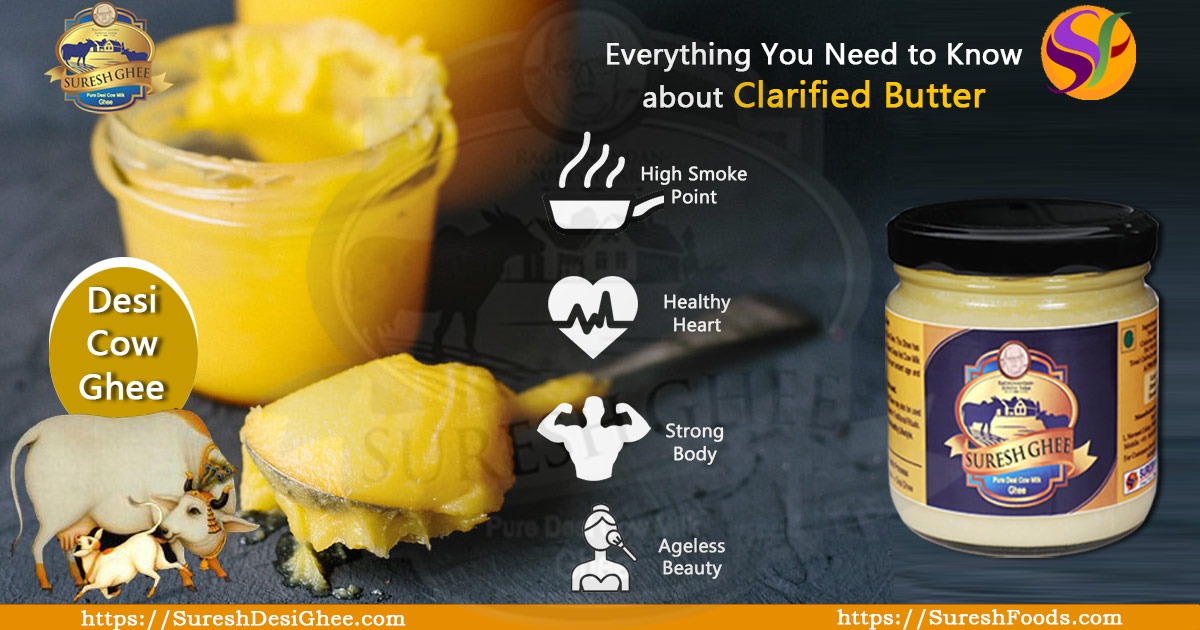
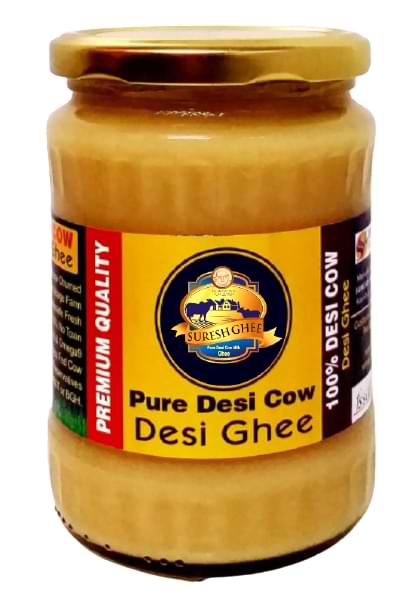
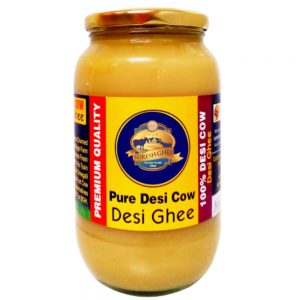
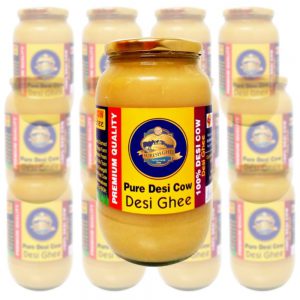
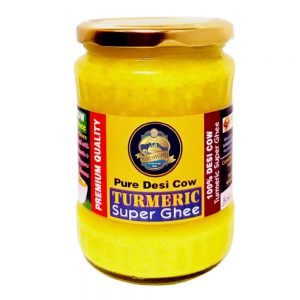
 WhatsApp us
WhatsApp us 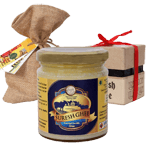
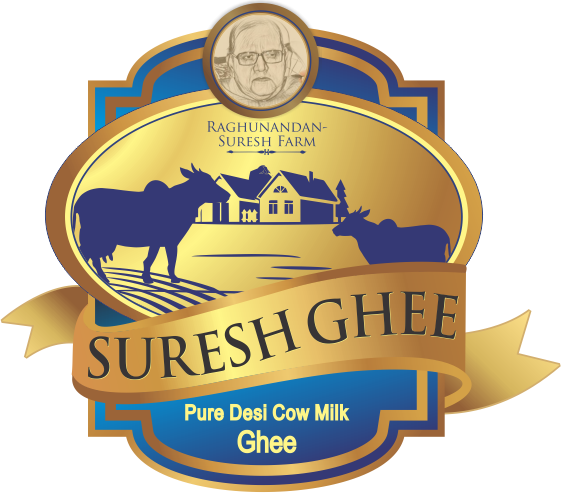
Naveen m...